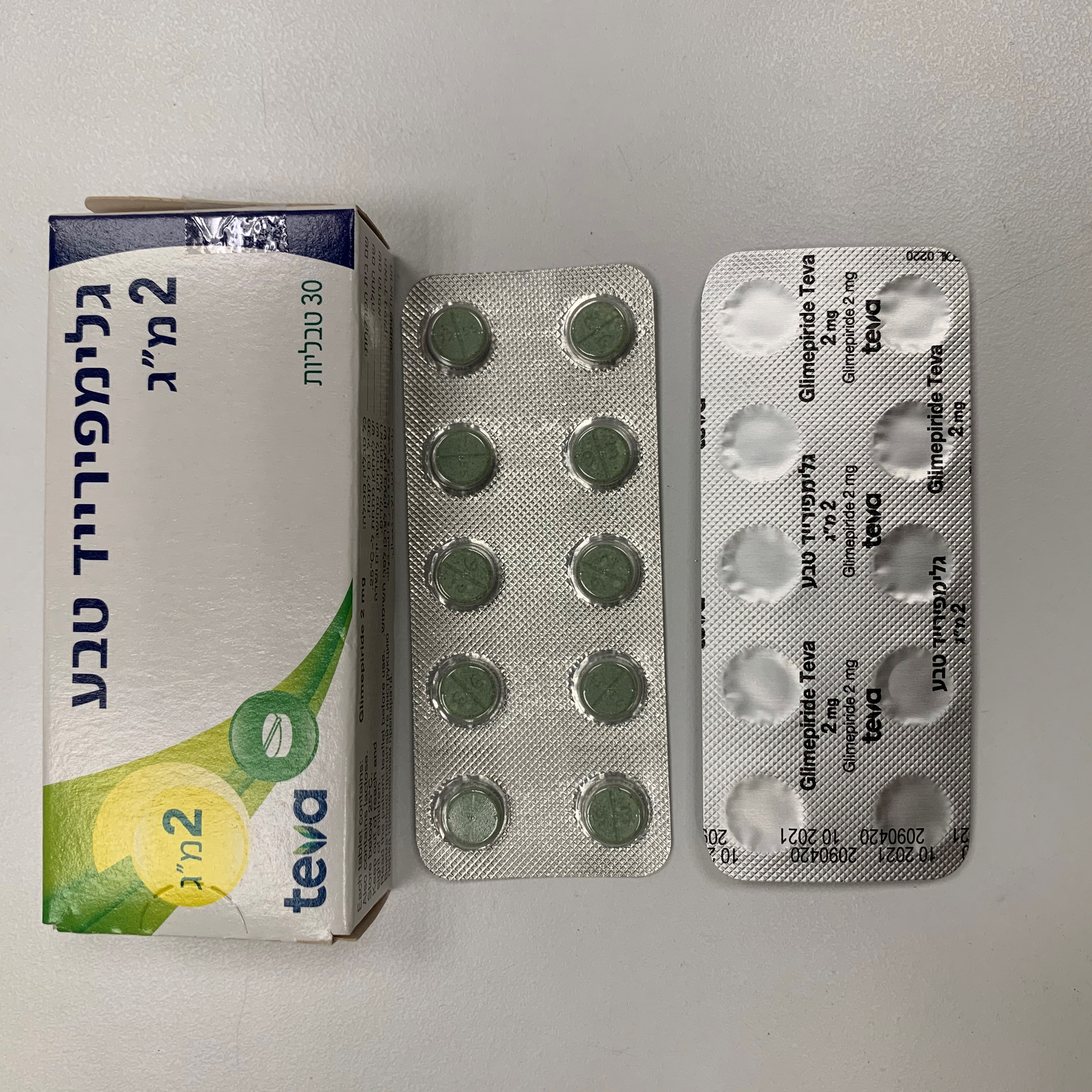Quest for the right Drug

גלימפירייד טבע ® 2 מ"ג GLIMEPIRIDE TEVA ® 2 MG (GLIMEPIRIDE)
תרופה במרשם
תרופה בסל
נרקוטיקה
ציטוטוקסיקה
צורת מתן:
פומי : PER OS
צורת מינון:
טבליה : TABLETS
עלון לרופא
מינוניםPosology התוויות
Indications תופעות לוואי
Adverse reactions התוויות נגד
Contraindications אינטראקציות
Interactions מינון יתר
Overdose הריון/הנקה
Pregnancy & Lactation אוכלוסיות מיוחדות
Special populations תכונות פרמקולוגיות
Pharmacological properties מידע רוקחי
Pharmaceutical particulars אזהרת שימוש
Special Warning עלון לרופא
Physicians Leaflet
Special Warning : אזהרת שימוש
4.4 Special warnings and precautions for use Glimepiride must be taken shortly before or during a meal. When meals are taken at irregular hours or skipped altogether, treatment with glimepiride may lead to hypoglycemia. Possible symptoms of hypoglycemia include headache, ravenous hunger, nausea, vomiting, lassitude, sleepiness, disordered sleep, restlessness, aggressiveness, impaired concentration, alertness and reaction time, depression, confusion, speech and visual disorders, aphasia, tremor, paresis, sensory disturbances, dizziness, helplessness, loss of self- control, delirium, cerebral convulsions, somnolence and loss of consciousness up to and including coma, shallow respiration and bradycardia. In addition, signs of adrenergic counter- regulation may be present such as sweating, clammy skin, anxiety, tachycardia, hypertension, palpitations, angina pectoris and cardiac arrhythmias. The clinical picture of a severe hypoglycemic attack may resemble that of a stroke. Symptoms can almost always be promptly controlled by immediate intake of carbohydrates (sugar). Artificial sweeteners have no effect. It is known from other sulfonylureas that, despite initially successful countermeasures, hypoglycemia may recur. Severe hypoglycemia or prolonged hypoglycemia, only temporarily controlled by the usual amounts of sugar, require immediate medical treatment and occasionally hospitalisation. Factors favouring hypoglycemia include: − unwillingness or (more commonly in older patients) incapacity of the patient to cooperate, − undernutrition, irregular mealtimes or missed meals or periods of fasting, − alterations in diet, − imbalance between physical exertion and carbohydrate intake, − consumption of alcohol, especially in combination with skipped meals, − impaired renal function, − serious liver dysfunction, − overdose with glimepiride, − certain uncompensated disorders of the endocrine system affecting carbohydrate metabolism or counter-regulation of hypoglycemia (as for example in certain disorders of thyroid function and in anterior pituitary or adrenocortical insufficiency), − concurrent administration of certain other medicinal products (see section 4.5). Treatment with glimepiride requires regular monitoring of glucose levels in blood and urine. In addition, determination of the proportion of glycosylated hemoglobin is recommended. Regular hepatic and hematological monitoring (especially leucocytes and thrombocytes) are required during treatment with glimepiride. In stress situations (e.g., accidents, acute operations, infections with fever, etc.) a temporary switch to insulin may be indicated. No experience has been gained concerning the use of glimepiride in patients with severe impairment of liver function or dialysis patients. In patients with severe impairment of renal or liver function change-over to insulin is indicated. Treatment of patients with G6PD deficiency with sulfonylurea agents can lead to hemolytic anemia. Since glimepiride belongs to the class of sulfonylurea agents, caution should be used in patients with G6PD-deficiency and a non-sulfonylurea alternative should be considered. Excipients Lactose Patients with rare hereditary problems of galactose intolerance, total lactase deficiency or glucose-galactose malabsorption should not take this medicine. Sodium This medicinal product contains less than 1 mmol sodium (23 mg) per tablet, that is to say essentially ‘sodium-free’.
Effects on Driving
4.7 Effects on ability to drive and use machines No studies on the effects on the ability to drive and use machines have been performed. The patient's ability to concentrate and react may be impaired as a result of hypoglycemia or hyperglycemia or, for example, as a result of visual impairment. This may constitute a risk in situations where these abilities are of special importance (e.g., driving a car or operating machinery). Patients should be advised to take precautions to avoid hypoglycemia whilst driving. This is particularly important in those who have reduced or absent awareness of the warning symptoms of hypoglycemia or have frequent episodes of hypoglycemia. It should be considered whether it is advisable to drive or operate machinery in these circumstances.

פרטי מסגרת הכללה בסל
התרופה תינתן לטיפול בסוכרת סוג 2.
מסגרת הכללה בסל
התוויות הכלולות במסגרת הסל
| התוויה | תאריך הכללה | תחום קליני | Class Effect | מצב מחלה |
|---|---|---|---|---|
| התרופה תינתן לטיפול בסוכרת סוג 2. |
שימוש לפי פנקס קופ''ח כללית 1994
לא צוין
תאריך הכללה מקורי בסל
15/01/2015
הגבלות
תרופה מוגבלת לרישום ע'י רופא מומחה או הגבלה אחרת
מידע נוסף
